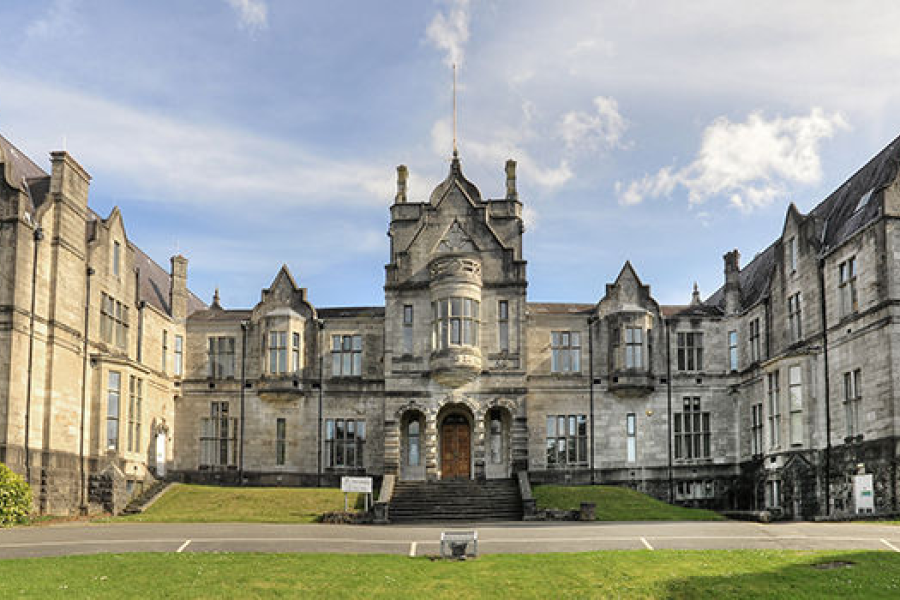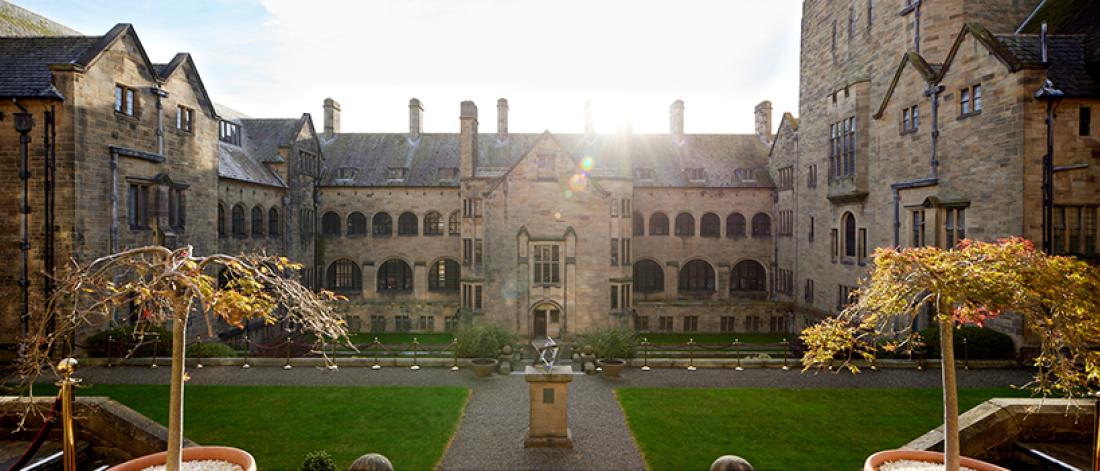About This Course
If you want to change the future of business and make a global impact in society, then this is the degree is for you. Business Management will give you an understanding of how organisations and managers operate in a global environment while developing the key digital, analytical, problem- solving and interpersonal skills that are attractive to employers. You’ll be studying at a modern, enterprising and dynamic business school. You’ll be exposed to management practice, organisation theory and the global business environment, as well as many other aspects of business, like leadership, sustainability, innovation, marketing, operations, human resource management, strategy, new venture creation, finance, adapting to change and e-business. You’ll study real organisations in order to gain strong business acumen and knowledge of management processes.
Whether you want to be entrepreneurial and setup your own business, or work with international companies, start-ups or not-for-profits or even work for governmental based organisations, this programme will give you the ability and expertise to accelerate your career. Almost all activities that humans undertake benefit from being managed effectively. The functions of management will be placed in the context of Toffler’s famous statement ‘the only constant is change’, so you will learn how to think innovatively in order to behave ethically, sustainably and globally.
Why choose Bangor University for this Business Management BSc?
- Engaging and innovative programme using a multidisciplinary approach to analysing international business challenges.
- You will be taught by academics who are experts in their areas and whose research contributes to the development of policy, the advancement of their disciplines, and even the better understanding of business itself.
- 3rd for Teaching Quality: Business, Management and Marketing (Times & Sunday Times: Good University Guide 2023)
- 97% Overall Satisfaction within the subject area of Management (National Student Survey 2022)
- Bangor Business School is focused on helping you build your employability by giving you opportunities to engage with businesses, undertake work placements and internships and participate in business competitions and other initiatives such as ENACTUS, our social enterprise programme.
Additional Course Options
This course is available with a Placement Year option where you will study for 1 additional year. The Placement Year is undertaken at the end of the second year and students are away for the whole of the academic year.
The Placement Year provides you with a fantastic opportunity to broaden your horizons and develop valuable skills and contacts through working with a self-sourced organisation relevant to your degree subject. The minimum period in placement (at one or more locations) is seven calendar months; more usually you would spend 10-12 months with a placement provider. You would normally start sometime in the period June to September of your second year and finish between June and September the following year. Placements can be UK-based or overseas and you will work with staff to plan and finalise the placement arrangements.
You will be expected to find and arrange a suitable placement to complement your degree and will be fully supported throughout by a dedicated member of staff at your academic School and the University’s Careers and Employability Services.
You will have the opportunity to fully consider this option when you have started your course at Bangor and can make an application for a transfer onto this pathway at the appropriate time. Read more about the work experience opportunities that may be available to you or, if you have any questions, please get in touch.
This course is available with an International Experience Year option where you will study or work abroad for 1 additional year. You will have ‘with International Experience’ added to your degree title on graduating.
Studying abroad is a great opportunity to see a different way of life, learn about new cultures and broaden your horizons. With international experience of this kind, you’ll really improve your career prospects. There are a wide variety of destinations and partner universities to choose from. If you plan to study in a country where English is not spoken natively, there may be language courses available for you at Bangor and in your host university to improve your language skills.
You will have the opportunity to fully consider this option at any time during your degree at Bangor and make your application. If you have any questions in the meantime, please get in touch.
Read more about the International Experience Year programme and see the studying or working abroad options on the Student Exchanges section of our website.
Course Content
You will learn the theoretical base of individual management functions but also the means to achieve integration to create an effective organisation. In addition to a mix of lectures, interactive workshops, and online support material you will experience insights from practising managers from organisations of different sizes operating in a range of industry sectors. A particular strength of the programme is the opportunity to engage with entrepreneurs, many of whom have achieved success with a series of new enterprises.
You will be an active member of a group of students studying similar degrees in Bangor Business School, thus being exposed to a broad spectrum of management situations.
The student population on the modules that you study will be truly international providing a live insight to the benefits (and challenges) of operating cross-culturally in a global economy.
There are opportunities to gain experience of work, and to study away from Bangor at one of our international partners.
A variety of methods will be used to assess your learning - including coursework, examinations, presentations, and project reports.
What will you study on this course?
In Year 1, students will take 80 credits from the following topics, Introduction to Contemporary Management Issues in Ethics, Sustainability, HRM, and Tourism, Principles of Management Accounting and Principles of Management and Organisation. There are also optional modules available in topics such as Business Analytics, Introduction to the employee life-cycle, Personal Finance and Banking and Foundations of Marketing. Students can also choose optional modules from other Business School level 4 modules or from elsewhere in the University, subject to timetabling constraints.
In Year 2, students will take 80 credits from the following topics, Management Planning and Coordination, Operations Strategy across the Enterprise and Business Information Systems. There are also optional modules available in topics such as Law for Business and Marketing Research and CRM. Students can also choose optional modules from other Business School level 5 modules or from elsewhere in the University, subject to timetabling constraints and pre-requisites.
In Year 3, students will take 80 credits from topics such as Enterprise, Creativity and Innovation and Strategic Management. There are also optional modules available in topics such as International Business & Global Competency. Students can also choose optional modules from other Business School level 6 modules or from elsewhere in the University, subject to timetabling constraints and pre-requisites.
Please note course content is for guidance purposes only and may be subject to change.
My course has a combination of many exciting modules, which allow me to do research, build reports and business portfolios, and give me a clear understanding of my field and how to be competitive in the business market.
Modules for the current academic year
Module listings are for guide purposes only and are subject to change. Find out what our students are currently studying on the Business Management BSc (Hons) Modules page.
Course content is for guidance purposes only and may be subject to change.
Facilities
General University Facilities
Library and Archive Services
Our four libraries provide a range of attractive study environments including collaborative work areas, meeting rooms and silent study spaces.
We have an extensive collection of books and journals and many of the journals are available online in full-text format.
We house one of the largest university-based archives not only in Wales, but also the UK. Allied to the Archives is the Special Collections of rare printed books.
Learning Resources
There is a range of learning resources available, supported by experienced staff, to help you in your studies.
The University’s IT Services provides computing, media and reprographics facilities and services including:
- Over 1,150 computers for students, with some PC rooms open 24 hours a day
- Blackboard, a commercial Virtual Learning Environment, that makes learning materials available on-line.
Course Costs
General University Costs
Home (UK) students
Information on fees and finance for Home (UK) students
International (including EU) students
Additional Costs
There are also some common additional costs that are likely to arise for students on all courses, for example:
- If you choose to study abroad or take the International Experience Year as part of your course.
- If you attend your Graduation Ceremony, there will be a cost for gown hire (£25-£75) and cost for additional guest tickets (c.£12 each).
Course-specific additional costs
Depending on the course you are studying, there may be additional course-specific costs that you will be required to meet. These fall into three categories:
- Mandatory Costs: these are related to a particular core or compulsory module that you’ll be required to complete to achieve your qualification e.g. compulsory field trips, uniforms for students on placement, DBS Check.
- Necessarily Incurred Costs: these may not be experienced by all students, and will vary depending on the course e.g. professional body membership, travel to placements, specialist software, personal safety equipment.
- Optional Costs: these depend on your choice of modules or activity and they are shown to give you an indication of the optional costs that may arise to make sure your choice is as informed as possible. These can include graduation events for your course, optional field trips, Welcome Week trips.
Entry Requirements
GCSE Maths at grade C/4 required if not demonstrated by the Level 3 qualification.
Offers are tariff based, 104 - 136 tariff points from a Level 3 qualification* e.g.:
- A Levels: General Studies and Key Skills not normally accepted
- BTEC National Extended Diploma: DMM - DDD
- Cambridge Technical Extended Diploma: DMM - DDD
- International Baccalaureate Diploma: accepted
- Access: pass required
- Welsh Baccalaureate: We will accept this qualification in conjunction with other level 3 qualifications
- T Levels: T Levels in a relevant subject considered on a case-by-case basis
- Extended Project Qualification: Points can include a relevant Extended Project (EPQ) but must include a minimum 2 full A-levels, or equivalent.
We are happy to accept combinations of the qualifications listed above, as well as alternative Level 3 qualifications such as City & Guilds, Access and Cambridge Technical Diplomas.
We also welcome applications from mature learners.
International Candidates: International Candidates: school leaving qualifications that are equivalent to A levels/Level 3 and/or college diplomas are accepted from countries worldwide (subject to minimum English Language requirements). More information can be found on our International pages.
*For a full list of accepted Level 3 qualifications, go to www.ucas.com.
GCSE Maths at grade C/4 required if not demonstrated by the Level 3 qualification.
Offers are tariff based, 104 - 136 tariff points from a Level 3 qualification* e.g.:
- A Levels: General Studies and Key Skills not normally accepted
- BTEC National Extended Diploma: DMM - DDD
- Cambridge Technical Extended Diploma: DMM - DDD
- International Baccalaureate Diploma: accepted
- Access: pass required
- Welsh Baccalaureate: We will accept this qualification in conjunction with other level 3 qualifications
- T Levels: T Levels in a relevant subject considered on a case-by-case basis
- Extended Project Qualification: Points can include a relevant Extended Project (EPQ) but must include a minimum 2 full A-levels, or equivalent.
We are happy to accept combinations of the qualifications listed above, as well as alternative Level 3 qualifications such as City & Guilds, Access and Cambridge Technical Diplomas.
We also welcome applications from mature learners.
International Candidates: International Candidates: school leaving qualifications that are equivalent to A levels/Level 3 and/or college diplomas are accepted from countries worldwide (subject to minimum English Language requirements). More information can be found on our International pages.
*For a full list of accepted Level 3 qualifications, go to www.ucas.com.
General University Requirements
To study for a degree, you’ll be asked for a minimum of UCAS Tariff points. For a fuller explanation of the UCAS Tariff Points, please see www.ucas.com.
We accept students with a wide range of qualifications and backgrounds and consider each application individually.
All students need to have good basic skills and the University also values IT and communication skills.
As part of the University’s policy, we consider applications from prospective disabled students on the same grounds as all other students.
We also consider applications from mature students who can demonstrate the motivation and commitment to study a university programme. Each year we enrol a significant number of mature students. For more information about studying as a mature student, see our Studying at Bangor section of the website.
EU and International Students' Entry Requirements
For detailed guidance on the entry requirements for EU and International Students, including the minimum English Language entry requirement, please visit the Entry Requirements by Country pages. International applicants can also visit the International Education Centre section of our website for further details.
Bangor University offers International Incorporated Bachelor Degrees for International students whose High School qualification is not equivalent to the UK school leaving qualification. The first year (or Year 0) is studied at Bangor University International College, an embedded College on our University campus and delivered by Oxford International Education Group.
Careers
The global economy would not operate without individuals who are skilled in applying techniques from individual management functions - in an integrated manner. Demand for people with theoretical knowledge, but more importantly with insights to practical application, is strong all around the world in organisations of all sizes, and types of operation.
Your career could be in any part of the global value chain which keeps the world economy functioning. Alternatively, you will have gained the skills and insights to consider starting your own enterprise.
This degree will equip you with the skills to think strategically and creatively when solving problems and managing change, so your horizons should extend beyond commercial activities to consider the many career opportunities in the public and not-for-profit sector.
Opportunities at Bangor
The University’s Careers and Employability Service provides a wide range of resources to help you achieve your graduate ambitions.
Internships
Bangor University runs a paid internship scheme within the university’s academic and service departments.
Student Volunteering
Volunteering widens your experience and improves your employability. Find out more about volunteering on the Students’ Union’s website.
Foundation Year
A 'with Foundation Year' option is available for this course. Apply for Business Management (with Foundation Year).
What is a Foundation Year course?
If you don’t have the required qualifications for the degree-level course or are looking to re-enter education after time away from study, then a Foundation Year Programme might be the right choice for you.
The Foundation Year is an excellent introduction to studying this subject at university and will provide you with the knowledge, skills and confidence required to go on to study this course at degree-level.
When you have successfully completed the Foundation Year, you can progress on to the first year of this degree-level course.





